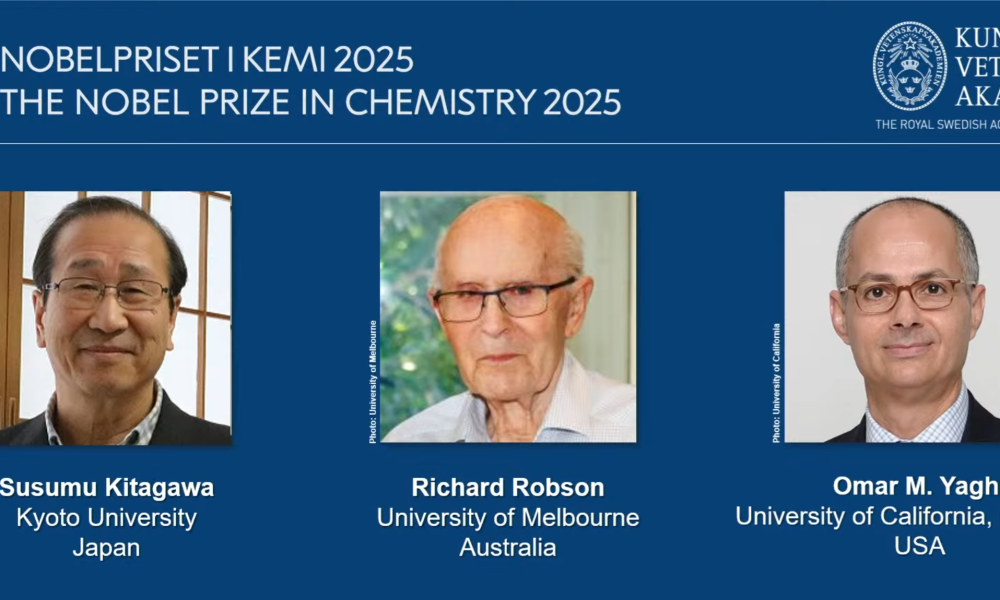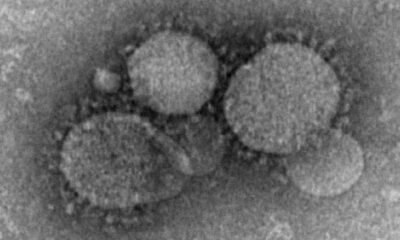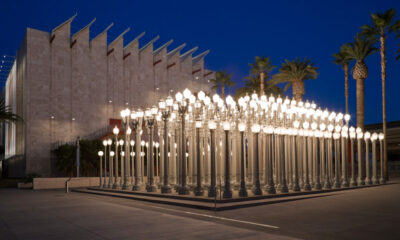World
3 scientists win Nobel Prize in Chemistry for metal–organic frameworks

The 2025 Nobel Prize in Chemistry has been awarded to Susumu Kitagawa, Richard Robson, and Omar M. Yaghi for developing metal–organic frameworks, materials that can trap, store, and filter gases and other chemicals, according to the Royal Swedish Academy of Sciences.
The Academy said on Wednesday the three scientists created a new type of molecular structure with open, spacious frameworks that act like microscopic cages.
These materials, known as metal–organic frameworks (MOFs), can be designed to capture specific substances such as carbon dioxide or toxic gases, store clean energy, and even extract water from desert air.
“Metal–organic frameworks have enormous potential, bringing previously unforeseen opportunities for custom-made materials with new functions,” said Heiner Linke, chair of the Nobel Committee for Chemistry.
The discovery of MOFs began in 1989, when Richard Robson of the University of Melbourne built the first crystal-like framework by linking copper ions with organic molecules, forming a structure full of empty spaces. The idea was groundbreaking, but the material was unstable.
In the 1990s, Susumu Kitagawa of Kyoto University and Omar Yaghi of the University of California, Berkeley, made key advances to stabilize and improve the materials. Kitagawa demonstrated that gases could move through the frameworks, while Yaghi developed highly stable versions that could be fine-tuned for specific purposes.
Since then, scientists have created tens of thousands of MOFs with diverse applications, from capturing industrial emissions to filtering water contaminants. Researchers believe they could play an important role in addressing major environmental challenges, including climate change and water scarcity.
Kitagawa, born in 1951 in Kyoto, Japan, earned his Ph.D. from Kyoto University, where he is now a professor.
Robson, born in 1937 in Glusburn, United Kingdom, received his Ph.D. from the University of Oxford and teaches at the University of Melbourne.
Yaghi, born in 1965 in Amman, Jordan, earned his Ph.D. from the University of Illinois Urbana-Champaign and is a professor at the University of California, Berkeley.
The three laureates will share the prize of 11 million Swedish kronor (about $1 million).
Earlier this week, the Nobel Prize in Physiology or Medicine was awarded to Mary E. Brunkow, Fred Ramsdell, and Shimon Sakaguchi for discovering how the immune system learns to tolerate the body’s own cells.
The Nobel Prize in Literature will be announced on Thursday, followed by the Peace Prize on Friday and the Economics Prize on Monday.

-

 Health4 days ago
Health4 days agoFrance confirms 2 MERS coronavirus cases in returning travelers
-

 Health6 days ago
Health6 days ago8 kittens die of H5N1 bird flu in the Netherlands
-

 Entertainment4 days ago
Entertainment4 days agoJoey Valence & Brae criticize DHS over unauthorized use of their music
-

 Legal1 week ago
Legal1 week ago15 people shot, 4 killed, at birthday party in Stockton, California
-

 US News6 days ago
US News6 days agoFire breaks out at Raleigh Convention Center in North Carolina
-

 US News1 day ago
US News1 day agoMagnitude 7.0 earthquake strikes near Alaska–Canada border
-

 Health5 days ago
Health5 days agoEthiopia reports new case in Marburg virus outbreak
-

 Legal3 days ago
Legal3 days agoWoman detained after firing gun outside Los Angeles County Museum of Art




